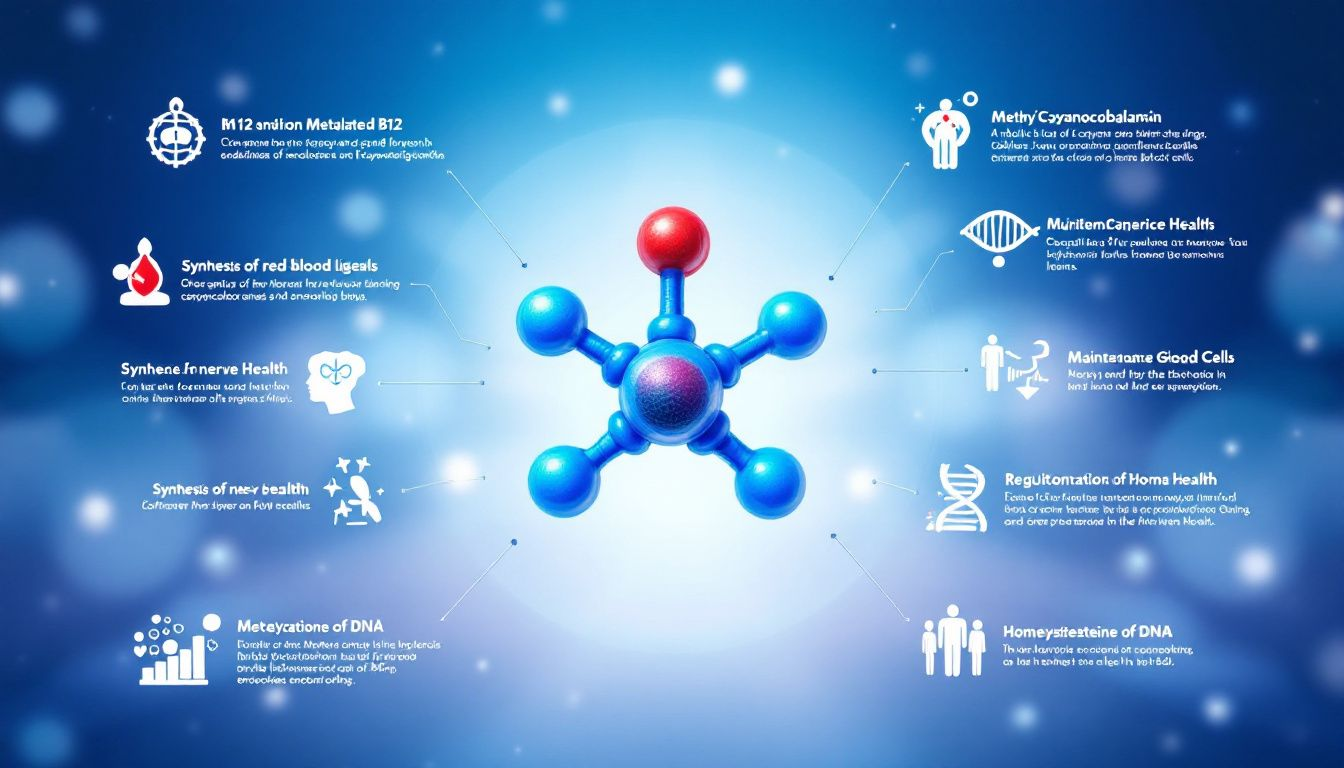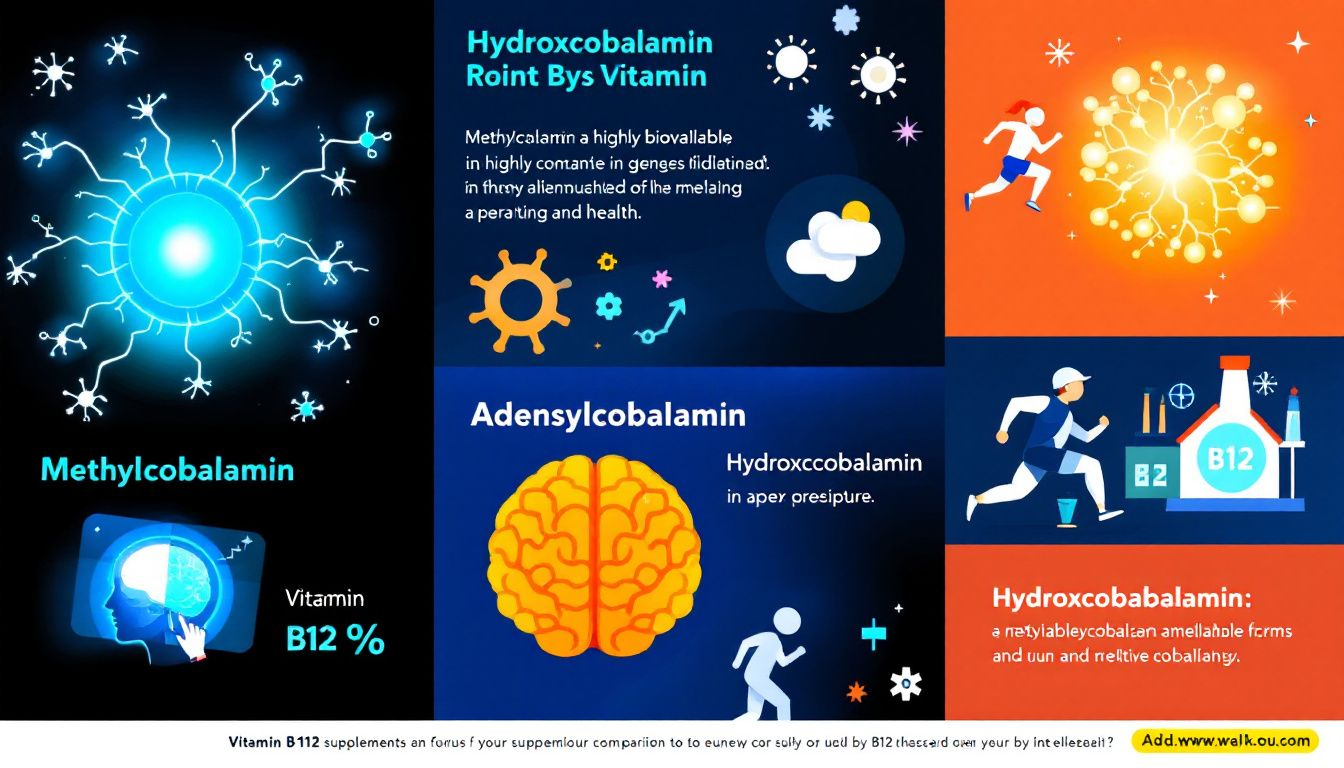Methylated B12 is a bioavailable form of Vitamin B12 vital for DNA methylation and overall health. This article explains what methylated B12 is, its benefits, and how it affects you.
Key Takeaways
Methylated B12, or methylcobalamin, is a bioactive form of Vitamin B12 essential for DNA methylation, red blood cell formation, and overall health.
Maintaining adequate levels of methylated B12 and folate is critical for normal DNA methylation patterns, which influence gene expression and reduce disease risk.
Methylated B12 supports various health benefits including cognitive function improvement, mood regulation, and detoxification, while its deficiency can lead to fatigue and cognitive decline.
What is Methylated B12?

Methylated B12, scientifically known as methylcobalamin, is a naturally occurring form of Vitamin B12 that can be sourced from both food and supplements. Unlike its synthetic counterpart, cyanocobalamin, methylcobalamin boasts higher bioavailability, meaning it is more readily absorbed and retained by the body’s tissues, resulting in lower urinary excretion. This makes it a superior choice for those looking to optimize their Vitamin B12 levels.
Methylcobalamin is the active form of Vitamin B12. It plays a role in the methylation cycle. This form is pivotal for the numerous biochemical reactions that occur within our cells. It is essential for red blood cell formation, nerve function, and the production of DNA. When we consume methylated B12, our bodies can utilize it more efficiently, ensuring that these critical processes run smoothly.
In essence, methylated B12 is not just another vitamin supplement. It is a bioactive form that actively participates in maintaining our overall health. Its role in the methylation cycle underscores its importance, as it helps in the transfer of methyl groups, which are vital for DNA synthesis and repair. This makes it an indispensable nutrient for anyone looking to support their genetic health and overall well-being.
Importance of DNA Methylation
DNA methylation is a crucial epigenetic mechanism that regulates gene expression and maintains DNA stability through epigenetic processes, including lymphocyte dna methylation. Adding a methyl group to the DNA molecule can switch genes on or off, controlling which genes are expressed. This “on/off switch” function is vital for numerous biological processes, including early embryonic development and the maintenance of cellular function.
Vitamin B12 and folate are essential for synthesizing methionine, a critical amino acid necessary for maintaining DNA methylation patterns. Deficiencies in these vitamins can lead to abnormal DNA methylation, which has been linked to an increased risk of cancer and other diseases. Thus, maintaining adequate levels of Vitamin B12 and folate is crucial for healthy DNA methylation and overall genomic stability.
Changes in DNA methylation have profound implications for health. For example, global DNA methylation changes can affect dna methylation in multiple genomic regions, leading to aberrant dna methylation and increased disease risk. Studies have identified differentially methylated regions and a differentially methylated region that are influenced by serum levels of folate and Vitamin B12, highlighting the direct impact of these nutrients on our genome wide dna methylation.
In summary, DNA methylation is a fundamental process that affects how our genes are expressed. Adequate intake of essential nutrients like Vitamin B12 and folate supports healthy DNA methylation patterns, promoting overall health and reducing disease risk. This intricate interplay between diet, genetics, and epigenetics underscores the importance of understanding and optimizing our nutrient intake.
How Methylated B12 Affects DNA Methylation
Methylated B12 is essential for proper methylation processes in the body. Methylation status, which can be assessed through markers like homocysteine levels, SAM to SAH ratio, and histamine levels, provides insight into how well these processes are functioning. Maintaining optimal levels of methylated B12 is crucial for ensuring that methylation occurs efficiently, thereby supporting overall health.
Studies have shown that diets deficient in methyl donors, such as methylated B12, lead to significant global changes in DNA methylation. These changes can result in aberrant gene expression and increased disease risk. Conversely, higher serum levels of Vitamin B12 have been correlated with increased DNA methylation, indicating a positive relationship between B12 levels and methylation. This highlights the importance of adequate B12 intake for maintaining proper methylation and genomic stability.
In addition to supporting DNA methylation, methylated B12 plays a role in numerous other biochemical processes. It is involved in the synthesis of neurotransmitters, detoxification of harmful substances, and production of energy. Adequate levels of methylated B12 support these critical functions and promote overall health.
Ultimately, methylated B12 is a key nutrient that affects DNA methylation and overall health. Understanding its role and ensuring adequate intake through diet and supplements can support healthy gene expression, reduce disease risk, and enhance overall well-being.
Benefits of Methylated B12

Adequate levels of methylated B12 offer numerous health benefits. For instance, it can enhance cognitive function and may reduce the risk of neurodegenerative diseases. This is because methylated B12 is involved in the synthesis of myelin, the protective sheath around nerve fibers that ensures proper nerve function. Supporting myelin synthesis, methylated B12 helps maintain cognitive health and prevent conditions like multiple sclerosis.
Another significant benefit of methylated B12 is its potential to alleviate symptoms of depression. This form of B12 influences the production of serotonin, a neurotransmitter that plays a key role in mood regulation. Supporting serotonin production, methylated B12 can improve mood and reduce symptoms of depression.
Methylated B12 also plays a crucial role in detoxification. It helps make heavy metals and other harmful substances water-soluble, facilitating their excretion from the body. This detoxification process is essential for maintaining overall health and preventing the buildup of toxins that can lead to disease.
Furthermore, methylated B12 supports hormone balance by being essential for neurotransmitter synthesis. Adequate levels of this nutrient help maintain proper hormone levels, support energy production, and reduce fatigue. This makes methylated B12 an indispensable nutrient for overall vitality and well-being.
Methylation Cycle and Methylated B12
The methylation cycle is a critical biochemical process that involves the transfer of methyl groups to various molecules, including DNA and proteins. S-adenosylmethionine (SAM) serves as the primary methyl donor in these reactions, and its production requires the presence of ATP and the enzyme methionine adenosyltransferase. The balance between SAM and its by-product, S-adenosylhomocysteine (SAH), is crucial for maintaining efficient methylation processes.
Methylcobalamin, the active form of Vitamin B12, plays a crucial role in this cycle. It is essential for the formation of red blood cells, brain health, and DNA synthesis. Sufficient levels of Vitamin B12 are required for the effective operation of the MTHFR enzyme, which converts homocysteine to methionine. Methionine is then converted to SAM, which donates methyl groups in various methylation reactions.
Research indicates that Vitamin B12 status influences the activity of methionine synthase, an enzyme that plays a key role in recycling homocysteine back to methionine. This recycling process is essential for maintaining proper methylation status and preventing the accumulation of homocysteine, which can be harmful at elevated levels.
Maintaining adequate levels of methylated B12 is crucial for the stability of DNA methylation and overall health. Supporting the methylation cycle, methylated B12 ensures efficient biochemical processes, promoting overall well-being and reducing disease risk.
Methylated B12 vs. Other Forms of B12

Before:
Vitamin B12 exists in multiple forms. These include Methyl B12, Adenosyl B12, Hydroxo B12, and Cyano B12. While all these forms can be converted into active Vitamin B12 in the body, they differ in their bioavailability and retention. Methylcobalamin and hydroxocobalamin, for instance, are more readily absorbed and retained in the body’s tissues compared to the synthetic form, cyanocobalamin. This makes them more effective for long-term supplementation.
After:
Vitamin B12 exists in multiple forms:
Methyl B12
Adenosyl B12
Hydroxo B12
Cyano B12
While all these forms can be converted into active Vitamin B12 in the body, they differ in their bioavailability and retention. Methylcobalamin and hydroxocobalamin, for instance, are more readily absorbed and retained in the body’s tissues compared to the synthetic form, cyanocobalamin. This makes them more effective for long-term supplementation.
Cyanocobalamin, a synthetic variant of Vitamin B12, is generally considered more stable and cost-effective for supplementation. However, it requires conversion to active forms within the body, a process that can be inefficient, especially in individuals with certain genetic polymorphisms. Methylcobalamin, on the other hand, is already in its active form, making it more efficient for supporting the methylation cycle and overall health.
To optimize methylation and support overall health, it is advisable to choose Vitamin B12 supplements that contain methylcobalamin. This form is not only more bioavailable but also more effectively retained in the body, ensuring that critical biochemical processes are supported and maintained.
Common Symptoms of Methylated B12 Deficiency
Symptoms of methylated B12 deficiency can be quite debilitating and often go unnoticed until they become severe. One of the most common symptoms is fatigue, which can significantly impact daily life and productivity. Individuals with a deficiency may find themselves constantly tired, even after a full night’s sleep, making it difficult to perform everyday tasks.
Cognitive decline is another significant symptom of methylated B12 deficiency. This can manifest as memory loss, confusion, and disorientation, affecting one’s ability to think clearly and remember important information. In severe cases, this cognitive decline can mimic symptoms of dementia, leading to misdiagnosis and inappropriate treatment.
Additionally, mildly elevated homocysteine levels are a key indicator of a methylated B12 deficiency. Homocysteine is an amino acid that, at high levels, can increase the risk of cardiovascular diseases and other health issues. Monitoring homocysteine levels can help identify a deficiency early and allow for timely intervention to prevent further complications.
Dietary Sources and Supplements
Vitamin B12 is naturally found in a variety of animal-based foods, making it relatively easy for those who consume meat, fish, poultry, eggs, and dairy products to meet their nutritional needs. For vegetarians and vegans, fortified cereals and nutritional yeasts provide good plant-based sources of Vitamin B12.
When it comes to supplementation, methylcobalamin is often preferred for its safety and effectiveness. Dietary supplements of Vitamin B12 are available in various forms, including tablets, capsules, and sublingual preparations, with doses ranging from 5 to 500 mcg. Sublingual forms, which are placed under the tongue, have shown similar efficacy to oral forms in terms of absorption.
The recommended daily intake of Vitamin B12 for adults is 2.4 mcg, but absorption efficiency decreases at higher doses exceeding 1-2 mcg. Therefore, it is essential to choose an appropriate dosage to ensure optimal absorption and utilization by the body. Individuals following a vegetarian or vegan diet, as well as older adults and those with digestive issues, are at higher risk of deficiency and should consider regular supplementation.
It’s also important to note that B12 supplements can interact with certain medications, potentially affecting their absorption and efficacy. Consulting a healthcare provider before starting supplementation can help avoid any adverse interactions and ensure the best outcomes for overall health.
The Role of MTHFR Gene in Methylation
The MTHFR gene plays a crucial role in the body’s ability to convert 5,10-methyltetrahydrofolate to 5-MTHF, an essential step in the methionine cycle. This gene is the most common genetic mutation affecting Vitamin B12 conversion, with the C677T variant being particularly impactful. Individuals with this mutation, especially those with the homozygous TT genotype, often experience disrupted homocysteine metabolism, leading to a higher risk of deficiency.
MTHFR mutations can reduce enzyme efficacy by up to 70%, which significantly impacts how well methylated B12 is utilized by the body. This inefficiency can result in elevated homocysteine levels and a range of health issues, including cardiovascular diseases and neural tube defects. The thermolabile form of the MTHFR enzyme, resulting from the C677T mutation, has reduced activity at higher temperatures, further complicating the methylation process.
Both the methionine and biopterin cycles are halted in individuals with MTHFR mutations, affecting the synthesis of neurotransmitters and various methylation reactions. This can lead to symptoms such as fatigue, cognitive decline, and an increased risk of chronic diseases. Understanding one’s MTHFR status can be crucial for tailoring dietary and supplementation strategies to support optimal health.
In summary, the MTHFR gene plays a pivotal role in methylation and overall health. Genetic testing can help identify MTHFR mutations, allowing for personalized interventions that include adequate intake of methylated B12 and other supporting nutrients. This approach can help mitigate the impact of genetic mutations and promote better health outcomes.
Clinical Studies on Methylated B12

Numerous clinical studies have explored the effects of methylated B12 on DNA methylation and overall health. One study identified six statistically significant differentially methylated regions between participants taking supplements and those on a placebo, highlighting the direct impact of supplementation on DNA methylation. Another study found that long-term intake of folic acid and Vitamin B12 led to 162 differentially methylated positions compared to a placebo, demonstrating the extensive influence of these nutrients on the genome.
Changes in DNA methylation were observed in genes associated with embryonic development and cancer after Vitamin B12 and folic acid supplementation. These findings underscore the importance of maintaining adequate levels of these nutrients to support healthy gene expression and reduce the risk of disease. In one specific study, a differentially methylated position showed borderline statistical significance, indicating a potential area for further research.
In elderly subjects, changes in DNA methylation of several genes were noted as an outcome of long-term Vitamin B12 supplementation. Increases in mean DNA methylation were seen after intervention with Vitamin B12, suggesting that supplementation can positively affect methylation patterns in older adults. These studies used specialized DNA methylation arrays to assess methylation status and predict leukocyte composition, providing robust data on the effects of supplementation.
Overall, clinical studies have shown a significant difference in DNA methylation between groups receiving Vitamin B12 and those receiving a placebo. However, no pronounced effects on global DNA methylation levels were observed following long-term supplementation. These findings highlight the nuanced impact of Vitamin B12 on methylation and the importance of personalized approaches to supplementation.
Potential Side Effects and Considerations
While methylated B12 is generally safe, high doses can lead to side effects such as headaches, nausea, vomiting, diarrhea, fatigue, and tingling in the extremities. These symptoms are usually mild and resolve once the dosage is adjusted. However, it is essential to monitor intake and consult with a healthcare provider to avoid potential adverse effects.
Taking methylated B12 with Vitamin C can decrease the effectiveness of B12 due to interactions that affect absorption. To maximize the benefits of both nutrients, it is advisable to space their consumption by a few hours. This simple adjustment can help ensure that you receive the full benefits of each supplement without compromising their efficacy.
Overall, while methylated B12 supplementation offers numerous health benefits, it is crucial to be aware of potential side effects and interactions. A mindful approach to supplementation and consultation with healthcare professionals can help achieve optimal health outcomes and avoid complications.
Summary
The role of methylated B12 in DNA methylation and health is both profound and far-reaching. As a critical nutrient in the methylation cycle, methylated B12 supports essential processes such as red blood cell formation, nerve function, and DNA synthesis. By influencing DNA methylation, it helps regulate gene expression and maintain genomic stability, promoting overall health and reducing the risk of disease.
Clinical studies have demonstrated the significant impact of methylated B12 on DNA methylation patterns, particularly in elderly populations. These findings underscore the importance of adequate Vitamin B12 intake through diet and supplementation. Additionally, understanding genetic factors such as MTHFR mutations can help tailor personalized approaches to support optimal methylation and health.
In conclusion, maintaining proper levels of methylated B12 is essential for overall well-being. By ensuring adequate intake and being mindful of potential side effects and interactions, you can harness the full benefits of this vital nutrient. Embrace the power of methylated B12 to support your health journey and unlock the potential for a healthier, more vibrant life.
Frequently Asked Questions
What is the difference between methylated B12 and other forms of B12?
Methylated B12, or methylcobalamin, is a naturally occurring form of Vitamin B12 that offers greater bioavailability and retention in the body than synthetic forms such as cyanocobalamin. Therefore, it may be more effective for those requiring B12 supplementation.
How does methylated B12 affect DNA methylation?
Methylated B12 significantly influences DNA methylation by facilitating the transfer of methyl groups, which is vital for proper gene expression and maintaining genomic stability. Therefore, adequate levels of methylated B12 are essential for optimal DNA methylation processes.
What are the symptoms of a methylated B12 deficiency?
Methylated B12 deficiency can lead to symptoms such as fatigue, cognitive decline, memory loss, and confusion, along with elevated homocysteine levels that heighten cardiovascular risk. It is important to address these symptoms promptly to prevent further health complications.
What are the best dietary sources of methylated B12?
The best dietary sources of methylated B12 are animal-based foods, including fish, meat, poultry, eggs, and dairy products. For vegetarians and vegans, fortified cereals and nutritional yeasts serve as effective plant-based alternatives.
Can genetic mutations affect methylated B12 utilization?
Genetic mutations, particularly in the MTHFR gene, can indeed affect the utilization of methylated B12, potentially resulting in deficiency and related health complications. It is crucial to monitor B12 levels in individuals with such mutations to ensure proper health management.

